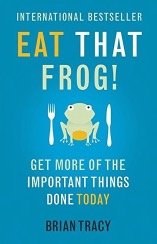**”Eat That Frog!”** by Brian Tracy is a popular book focused on time management, productivity, and overcoming procrastination. The central metaphor, “eat that frog,” refers to tackling your biggest and most important task first thing in the day—the task you’re most likely to procrastinate on. Here are the key lessons from the book:
### 1. **Tackle Your Most Important Task First (“Eat That Frog”)**
– **Identify your “frog”**: Your “frog” is the most important task that will have the biggest impact on your success. This is usually the task you’re most likely to procrastinate on.
– **Do it first**: Always start your day by tackling your hardest or most important task. This builds momentum and makes everything else feel easier.
### 2. **Set Clear Priorities**
– **Plan every day in advance**: Write down your tasks the night before or at the start of the day. Prioritize them so you know which tasks are most important.
– **Apply the 80/20 Rule (Pareto Principle)**: Focus on the 20% of tasks that will produce 80% of your results. Not all tasks are equal; identifying and concentrating on the most valuable tasks is crucial for success.
– **Use the ABCDE Method**: Label your tasks A (most important) to E (least important). Complete the A tasks first—those that have the biggest consequences if not done.
### 3. **Plan and Break Tasks Down**
– **Break tasks into small steps**: Large tasks can feel overwhelming, so break them down into manageable steps. This makes them less intimidating and easier to start.
– **Single-handling**: Focus on one task at a time without switching between tasks. Multitasking leads to inefficiency and distractions.
### 4. **Use the Power of Deadlines and Time Blocks**
– **Set deadlines**: Deadlines create a sense of urgency and help you stay focused. Even if the task doesn’t have an external deadline, create one for yourself.
– **Time blocking**: Allocate specific time blocks for specific tasks. This ensures that you have dedicated time to work on important tasks without distractions.
### 5. **Develop Self-Discipline**
– **The habit of starting**: Self-discipline is a muscle, and the more you exercise it, the stronger it gets. Developing the habit of starting tasks immediately is key to overcoming procrastination.
– **Take action immediately**: Procrastination is a habit that can be broken by forcing yourself to take the first step, no matter how small.
– **Visualize completion**: Imagine the feeling of satisfaction and accomplishment after completing the task. This can motivate you to take action.
### 6. **Focus on Results, Not Just Activities**
– **Results-oriented work**: Always ask yourself, “What results am I trying to achieve?” and focus on tasks that directly contribute to your goals.
– **Concentrate on high-value activities**: Ensure that most of your time is spent on activities that move you closer to your objectives, rather than being busy with low-value tasks.
### 7. **Leverage Your Strengths**
– **Identify your key strengths**: Focus on tasks that align with your strengths and where you can add the most value. Delegate or minimize tasks that fall outside your expertise.
– **Continuous learning**: Always seek to improve your skills. The better you become at your key tasks, the more productive you’ll be.
### 8. **Use Technology Wisely**
– **Limit distractions**: Modern technology can be a source of distractions, so use it wisely. Turn off notifications, limit time on social media, and set boundaries for communication.
– **Leverage productivity tools**: Use technology that helps streamline and automate your workflow, such as task management apps, calendars, or time trackers.
### 9. **Create Positive Work Habits**
– **Work in your energy zone**: Pay attention to when you’re most productive (morning, afternoon, etc.) and schedule your most important tasks during those peak times.
– **Develop daily routines**: Good habits, like starting each day with planning and prioritization, can improve productivity over time.
### 10. **Commit to Continuous Improvement**
– **Kaizen principle**: Continuously look for ways to improve your work habits and productivity skills. Small, consistent improvements over time lead to significant progress.
– **Personal responsibility**: Recognize that your success and productivity are in your hands. Take full responsibility for your time and results.
### Key Takeaway:
The central lesson of **”Eat That Frog!”** is that **successful people tackle their most important and difficult tasks first**. By focusing on priorities, using time effectively, and developing self-discipline, you can eliminate procrastination and dramatically increase productivity.
